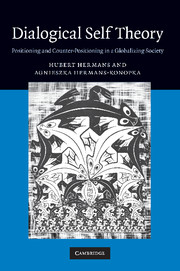Book contents
- Frontmatter
- Contents
- List of Illustrations
- Acknowledgments
- Introduction
- 1 The impact of globalization and localization on self and identity
- 2 Self and identity in historical perspective: traditional, modern, post-modern, and dialogical models
- 3 Positioning theory and dialogue
- 4 Positioning and dialogue in life-long development
- 5 A dialogical view of emotions
- 6 Practical implications for organizations, motivation, and conflict-resolution
- References
- Index
2 - Self and identity in historical perspective: traditional, modern, post-modern, and dialogical models
Published online by Cambridge University Press: 10 May 2010
- Frontmatter
- Contents
- List of Illustrations
- Acknowledgments
- Introduction
- 1 The impact of globalization and localization on self and identity
- 2 Self and identity in historical perspective: traditional, modern, post-modern, and dialogical models
- 3 Positioning theory and dialogue
- 4 Positioning and dialogue in life-long development
- 5 A dialogical view of emotions
- 6 Practical implications for organizations, motivation, and conflict-resolution
- References
- Index
Summary
The charm of history and its enigmatic lesson consist in the fact that, from age to age, nothing changes and yet everything is completely different
Aldous HuxleySelf and identity are both individual and social constructions. They participate in societies that are changing over time. The self in medieval times is not the same self as in post-modern times. There is no self-in-abstracto being subjected to external causation. As a historical construction the self is not simply externally influenced by the time in which it is living, but a process that is an expression of the time and space in which it evolves. Historical changes as intrinsic to the self-process are particularly recognized when self and identity are conceived of as extended in space and time. Whereas in the previous chapter we analyzed the self as extended in space, in the present chapter we focus on its extension in time. Historical changes are reflected in the collective aspects of self and identity. In order to articulate these changes and their implications for the self, we will distinguish three models that are associated with particular historical phases: traditional, modern, and post-modern. Elaborating on specific features of these models, we will discern a fourth model: the dialogical one that is the centrepiece of the present chapter.
Two remarks should be made in order to clarify the particular nature of this chapter. First, the different models do not represent purely successive phases in the course of history.
- Type
- Chapter
- Information
- Dialogical Self TheoryPositioning and Counter-Positioning in a Globalizing Society, pp. 82 - 119Publisher: Cambridge University PressPrint publication year: 2010



